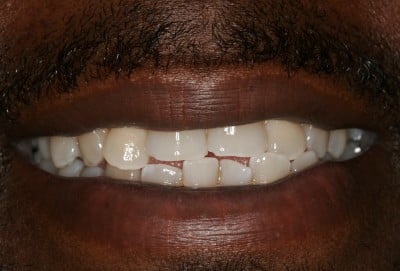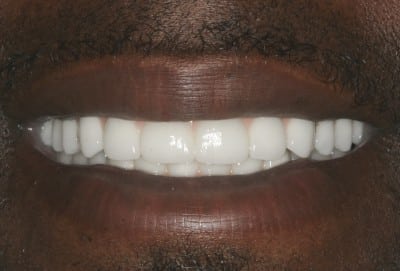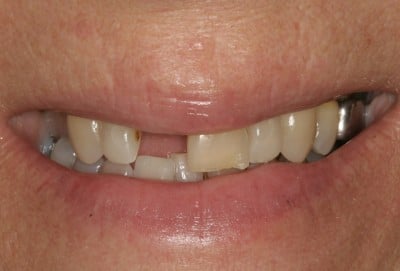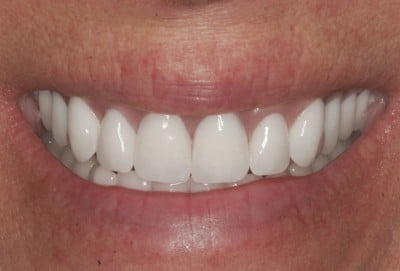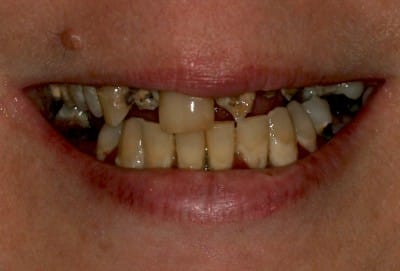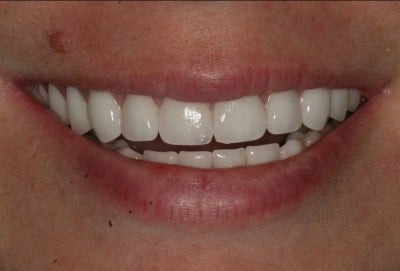Dental Implants in Sugar Land, TX
The Superior Answer for Replacing Missing Teeth
A missing tooth or two seems innocuous enough, but you’d be surprised at the havoc they can create. The surrounding teeth move, and your bite and alignment can become skewed. Plus, if the tooth is visible, it can make a person hide their smile, and that’s a crime!


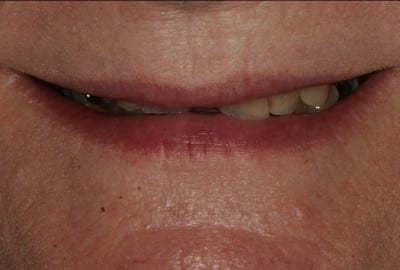
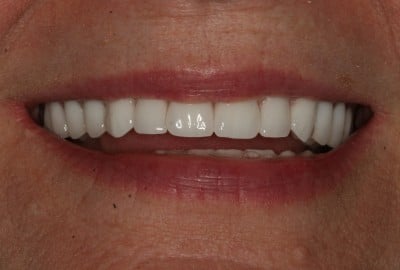
SmileTexas® Porcelain Veneers
Before and After
What Are Dental Implants?
A dental implant is a prosthetic replacement for a missing tooth. The tooth could have been lost due to injury or accident, or it could be so badly decayed that it cannot be saved. The name implant actually refers to the anchoring portion of the prosthetic. Shaped like a screw, the implant is made of titanium and screws down into the bone in the socket formerly occupied by the tooth root.
The bone then naturally grows around the implant, making it part of the jaw. Once this process is complete, a post is placed into the implant, and an artificial tooth is atop that. Dental implants behave like natural teeth because they are integrated into the bone. At SmileTexas®, we offer a comprehensive range of Dental Implant options.
 Benefits of Dental Implants
Benefits of Dental Implants
Many people lose a tooth or two and simply don’t replace them. Of course, this can lead to cosmetic issues with front teeth, but it can also lead to avoiding certain foods if the missing tooth is a molar.
Beyond the cosmetic issues, missing teeth cause problems with the other teeth and lead to bone loss. Without the pressure to stay in place, the adjacent teeth tend to slide over into the open gap, creating issues with your bite and the alignment of your teeth. Plus, when a person chews, a tremendous amount of bite-force energy is transferred through the teeth down into the bone.
This stimulation continually creates new bone mass. Without the stimulation (due to the missing teeth above), the bone in that area begins to deteriorate and resorb. That’s why many people with several missing teeth appear as if their faces are collapsing inward around their mouths.
Dental implants function exactly like your natural teeth. Unlike dentures, you don’t need to worry about them slipping, and you can say goodbye to messy adhesives. You can eat anything you want without worry; favorite foods such as corn on the cob can return to your diet!
Your beautiful new smile will also prevent gaps in your smile and whistling when you talk, boosting your confidence.
Ideal Candidates for Dental Implants
At SmileTexas®, we love how dental implants change patients’ lives. They regain confidence, are proud of their smiles, and can eat anything they want.
We feel just about anyone is a great candidate for implants. However, if you have been missing teeth for a long time, you may have some bone loss. In those cases, we may need to use bone grafting before placing implants.
Otherwise, anyone with normal bone mass is a good candidate for an implant or implants. If a few implants are not enough to address your losses, we also offer full-mouth restoration.
Most awesome staff there is. Dr. Kline is the best.
BEST DENTIST AND STAFF! My husband was so nervous about starting his dental work, five minutes after walking into this office we felt like family! Dr Rick Kline immediately addressed all of our concerns and eased all of my husbands fears. Dr Rick Kline is an ARTIST with teeth! I was a dental assistant for years and have never been so impressed by a doctor or staff like I was with this office! We will never go anywhere else!
Call Today!
The Dental Implant Procedure at SmileTexas®
During your consultation with Dr. Kline or Dr. Davis, we will perform a full oral exam and a CT scan to determine if you have sufficient bone mass to support implants. Once that is decided, the process involves four steps.
Placement
With minimal gum disruption, the titanium implant is screwed down into the socket left from the natural tooth.
Osseointegration
This is the process whereby the bone grows around the implant, fully integrating it. If only single implants are placed (not Teeth By Tonight!®), this can take three to six months.
Abutment
Once the implant has securely integrated with the surrounding bone, we attach a small metal post called an abutment to the implant. We then allow the surrounding gum tissue to heal for approximately another six weeks.
Crown
The final step is to attach the false tooth, known as a crown, onto the abutment. This false tooth is custom-made at a dental lab and perfectly matches the surrounding teeth. After placement, you’re ready to go out and use your new implants.
Dental Implant Before and After
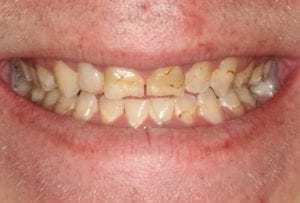
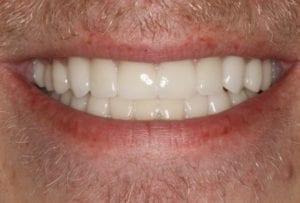
Foods to Avoid After Getting Dental Implants
For the first 24-48 hours after dental implant surgery, we advise only consuming soft foods and liquids to give your gums time to recover before you place pressure on them through biting and chewing.
For one to two weeks after your surgery, you’ll want to avoid the following foods:
- Tough, chewy foods like steak and jerky
- Crunchy foods like chips, popcorn, and raw vegetables
- Hard foods like nuts, ice, and hard candy
- Spicy and acidic foods, including oranges, tomatoes, and hot peppers
- Sticky foods like taffy or caramel
- Scorching foods and liquids
Additionally, using a straw after implant surgery can put undue pressure on your implants and hinder healing.
It’s important to note that once your dental implants fully heal and your final prosthetic is placed, you will not have any dietary restrictions.
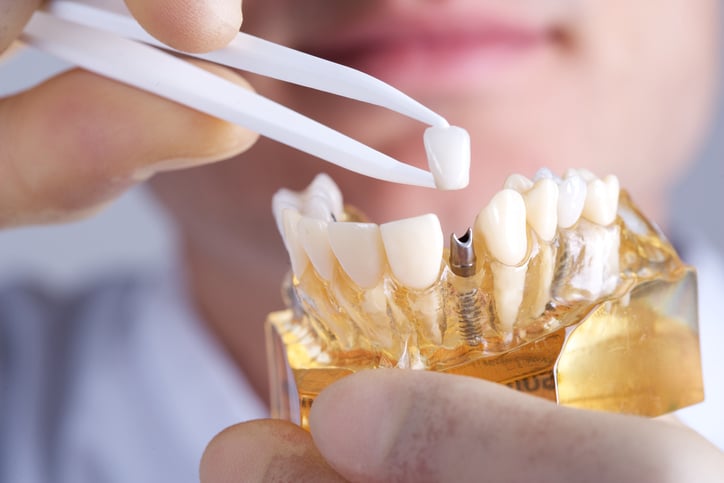
Activities to Avoid After Getting Dental Implants
Your sutures are especially vulnerable in the first few days after your dental implant surgery. Therefore, we advise refraining from exercise, as it may cause adverse side effects, including bleeding, swelling, and pain.
After surgery, any trauma to the mouth can cause severe complications and pain. Avoiding strenuous activities for three to four days after your procedure lowers your risk of dental implant failure. When you resume exercise after implant surgery, we recommend starting slowly with activities such as walking or swimming.
We advise waiting at least two weeks before engaging in any sports, especially contact sports. A mouthguard is always necessary if you resume contact sports after the designated waiting period.
“SmileTexas® completely transformed my smile. I used to have small teeth and was always self conscious and went to SmileTexas® and got veneers. I absolutely love my smile now and get so many compliments on my smile. Everyone at SmileTexas® is so nice and friendly and I definitely recommend it. SmileTexas® changed my life!!” – Kelsey
Read Our Testimonials
Are There Risks Associated with Dental Implants?
Every surgery has risks. However, complications and risks associated with dental implant surgery are rare. Potential complications include implant failure, improper placement, and infection.
Dental Implant Failure
Dental implant failure occurs when the bone doesn’t grow around the implant. As a result, the implant won’t securely hold the crown.
Patients experiencing dental implant failure may have the implant fall out independently or need to have it removed. The most common causes of dental implant failure are trauma or injury and infection.
Improper Placement
If there is a problem with the location or angle of the implant at the time of placement, it can lead to several complications. These include:
- Improper fusion with the bone
- Discomfort and pain
- Sinus damage
- Nerve damage
- Swelling or injury to the surrounding teeth and bones
If you fear improper implant placement, you may need to get it removed or replaced.
Infection
Like most medical procedures, there is a risk of infection after dental implant surgery. You will receive instructions on proper oral care after your surgery. If you follow these instructions, your risk of infection is minimal.
Will Insurance Cover Dental Implants?

There is a great deal of variation in coverage from dental insurance plans. Most basic plans do not cover implants. However, some plans may cover preliminary procedures, the cost of crowns, bridges, and dentures, or injuries that require dental implants.
Our team at SmileTexas® is happy to help you secure financing for any gaps in coverage from your dental insurance provider.
Are Dental Implants Painful?
The process of receiving dental implants involves very little pain. Generally, the only discomfort involved is the minor incision made in the gum tissue to access the jawbone when placing the titanium implant base into the jaw. After we place the implant base, your gums need to heal for a couple of weeks, but this isn’t overly painful. Placing the implant itself does not hurt, as your jawbone doesn’t have nerves.
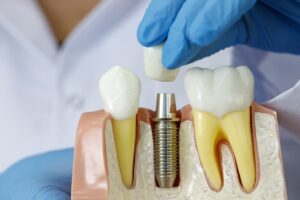
Maintaining Your New Implants
Not only do implants feel and function exactly like your natural teeth, but they also require the same care. Daily brushing, flossing, and an annual cleaning at your dentist’s office are all dental implants need.
Dental Implant FAQs
What’s the Difference Between Dental Implants vs. Dentures?
Replacing a whole arch of missing teeth with dental implants can be too costly for many patients, so they opt for traditional dentures.
Traditional dentures, while giving the patient back their smile, have never been a great solution. This is because the dentures are not anchored; they simply sit atop the gums. This allows them to slip when eating or even talking. Plus, they can leave the gums sore and irritated. And dentures don’t transfer bite energy down into the jawbone, so the jawbone continues to deteriorate. That’s why dentures need to be refit every year or so.
Dental implants are independent, individual prosthetics anchored into the jawbone. They function just like natural teeth, do not slip, and there are no limits on what you can eat. They also require no extra maintenance — just normal brushing and flossing. Implants never need to be refitted, either. Even if the artificial porcelain tooth breaks, creating another and attaching it to the implant base is simple.
What’s the Difference Between Dental Implants vs. Dental Bridges?
Traditional bridges have long been used to replace a missing tooth or two. When replacing a few missing teeth, bridges are sometimes called partial dentures. Traditional bridges are anchored on both sides of the gap by crowns placed on healthy teeth. The crowns are then attached to a metal base with the artificial tooth/teeth fused to it. The crown is one piece and is anchored by the two crowned teeth.
Crowns have a few problems. First, healthy teeth need to be shaved down to accept them. Second, bridges only last 10-15 years in most cases. Third, bridges can break or come loose when eating certain foods.
At SmileTexas®, we prefer replacing a missing tooth or two with dental implants. If more teeth are missing, we place at least one implant and can then anchor the partial artificial teeth to the implant/implants. This solution is far more durable, and the healthy teeth don’t need to be shaved down to accept crowns.
When Are Dental Implants Needed?
If you ask any of us at SmileTexas®, an implant is necessary whenever you’re missing a tooth or need a badly damaged or heavily decayed tooth extracted. As mentioned on this page, not replacing a tooth is a bad idea. You may save a few dollars now, but you’ll likely pay much more later when your teeth start moving around.
Remember, when you’re missing a tooth or a few teeth, the adjacent teeth no longer have any pressure to remain in place, and they tend to slide over into the gap. This destroys your bite and can lead to all sorts of issues, including temporomandibular joint disorder.
Cost of Dental Implants
Dental implants are more expensive upfront than most other dental procedures but become more economical in the long run. Once you schedule a consultation, our doctors will help you find the best plan. Remember that the total cost will be affected by how much work you need. We offer many different financing options to fit your budget because our main goal is to help you receive the smile you deserve.
Can Dental Implants Become Stained?
How Long Do Dental Implants Last?
How common are dental implants?
What Is the Typical Recovery Time After Dental Implant Surgery?
The typical recovery time after dental implant surgery depends on factors like the number of implants placed and whether other procedures (such as bone grafting) were performed.
Here’s what you can generally expect:
Initial Recovery (1-2 Weeks)
Most patients experience some swelling, discomfort, or minor bruising for a few days following the surgery. These symptoms will subside within the first week or two.
Osseointegration (3-6 Months)
During this phase, the implant fuses with the jawbone. Patients can often resume normal activities within days or weeks. However, the full healing process – where the implant integrates with the bone – can take several months.
Final Restoration Placement
Once osseointegration is complete, the abutment and crown or prosthetic teeth are attached. This usually occurs 3-6 months after the implant is placed.
What Is the Success Rate of Dental Implants?
Dental implants have a success rate of over 90%. This makes them one of the most reliable and effective solutions for replacing missing teeth.
Keep in mind that the likelihood of success can vary based on several factors, including:
- Oral Hygiene: Proper care includes regular brushing, flossing, and dental check-ups. These practices prevent inflammation around the implant, which can lead to failure.
- Bone Quality and Quantity: Sufficient jawbone density is essential for implant stability. Bone grafting – if required – may affect the timeline. It generally does not lower the success rate, though.
- Lifestyle Habits: Smoking and excessive alcohol consumption can impact healing and long-term implant success.
- Health Conditions: Conditions such as uncontrolled diabetes or immune system disorders may reduce the body’s ability to heal and integrate the implant.
- Location of the Implant: Implants in the upper back jaw tend to have a slightly lower success rate. This is due to the softer bone in that region than the lower jaw.
Will I Need a Bone Graft Before Getting a Dental Implant?
Whether you need a bone graft before getting a dental implant depends on the quality and quantity of your jawbone. Bone grafting is often necessary when the jawbone is insufficient to support the dental implant.
Here are some reasons why you might need a bone graft:
- Bone Loss: Tooth loss, gum disease, or prolonged absence of teeth can cause bone resorption over time. This reduces bone density.
- Jawbone Thinness: If the bone is too narrow or weak in the implant site, a graft can ensure proper support for the implant.
- Sinus Proximity: You may need a sinus lift to create space for an implant in the upper jaw near the molars and premolars.
- Trauma or Infections: Previous injuries or infections in the jawbone can lead to a need for reconstruction before implant placement.
Do You Offer Financing for Dental Implants?
Don’t let financial concerns stop you from getting the smile you deserve. One of our SmileTexas® team members can help you apply to one or more of our financial resources:
- Lending Club: Lending Club offers no interest financing at terms of 6, 12,18, and 24 months.
- Care Credit: Care Credit offers financing with no interest if paid in full within 6 or 12 months.
- Proceed Finance: Proceed Finance offers low-interest rates and repayment terms that last as long as 144 months.
What Causes Dental Implant Failure?
Dental implant failure is uncommon when they are correctly placed and cared for. However, it can happen. Some potential reasons for failure include:
- Insufficient Bone Density: If the jawbone does not have enough density to support the implant, it may not integrate.
- Poor Osseointegration: The implant must fuse with the jawbone in a process called osseointegration. If this does not occur, the implant may become loose or fail.
- Infection (Peri-Implantitis): Infections around the implant can lead to bone loss and implant failure.
- Teeth Grinding: Excessive pressure from grinding or clenching can damage the implant or prevent it from healing.
- Trauma or Injury: An impact to the face can loosen or damage the implant.
Can Smokers Get Dental Implants?
Smokers may still be able to get dental implants. They should keep in mind, though, that smoking increases the likelihood of complications and implant failure.
Nicotine and other chemicals found in tobacco restrict blood flow, slow healing, and weaken the bone and gum tissue needed to support the implant.
That said, some steps patients who smoke can take to improve implant success include:
- Quit Smoking Before Surgery: Stopping smoking at least one to two weeks before surgery and for several weeks after can improve healing.
- Follow Good Oral Hygiene: Brushing, flossing, and regular dental check-ups can reduce the risk of infections.
- Consider Smoking Alternatives: If quitting completely isn’t possible, cutting back or switching to nicotine patches may help.
- Use a Mouth Rinse: An antibacterial mouthwash can help keep the implant site clean.
Can I Still Get Dental Implants if I Have Diabetes?
People with controlled diabetes generally heal well. They have success rates similar to those without diabetes. Uncontrolled diabetes can increase the chances of complications, such as:
- Slower Healing: High blood sugar levels can impair the body’s ability to heal after surgery.
- Higher Risk of Infection: Diabetes weakens the immune system. This makes infections like peri-implantitis more likely.
- Poor Osseointegration: The implant may struggle to fuse with the jawbone if blood sugar levels are not stable.
To improve success, do the following:
- Keep blood sugar well-controlled before and after surgery.
- Follow a good oral hygiene routine to reduce the risk of infection.
- Work with both your dentist and doctor to monitor healing.
How Do I Get Ready for a Dental Implant Procedure?
Getting ready for a dental implant procedure involves several steps. Here’s what you need to know:
- Attend a Consultation & Evaluation: Your dentist or oral surgeon will perform an exam, which may include X-rays or a CBCT scan.
- Address Any Dental Issues: Gum disease, cavities, or infections must be treated before implant surgery.
- Stop Smoking & Avoid Alcohol: Smoking and vaping can slow healing, as can alcohol.
- Adjust Medications: If you take blood thinners, your dentist may consult your doctor about temporarily stopping or adjusting the dosage to reduce excessive bleeding.
- Wear Comfortable Clothing & Avoid Makeup: Wear loose, comfortable clothing for your appointment. Do not wear makeup, lipstick, or heavy skincare products, as they can interfere with the surgical area.
- Rest & Stay Hydrated: Get a good night’s sleep before your procedure to support healing. Stay hydrated, but avoid excessive caffeine or sugary drinks before surgery.
Schedule Your Free Dental Implant Consultation
To learn more about dental implants or to schedule a consultation, call our SmileTexas® Sugarland office at (281) 265-7645.



